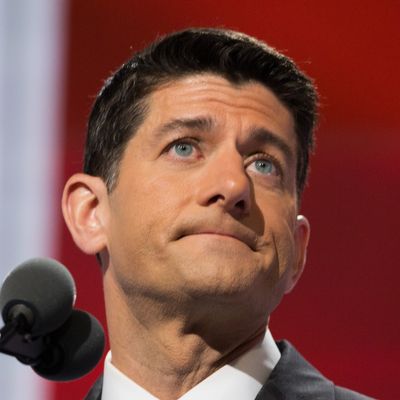
A day after Paul Ryan told GOP lawmakers it’s every man for himself when it comes to the fallout from grab-’em-by-the-pussy-gate, on Tuesday morning Donald Trump took to Twitter to accuse Establishment Republicans of hampering his effort to Make America Great Again.
Trump stuck with that theme throughout the day, focusing much of his ire on Ryan specifically (though he also attacked the “very foul mouthed” Senator John McCain for dropping him over “locker room remarks”). During a private fundraiser in San Antonio, he mocked Ryan for being part of the losing Romney 2012 ticket. “This guy lost four years ago,” he said, “in like a landslide.”
Then, in an interview with Bill O’Reilly, Trump said he doesn’t even care about having the backing of the House Speaker. “The fact is, I think we should get support and we don’t get the support from guys like Paul Ryan,” Trump said. “I’m just tired of nonsupport and I don’t really want his support. This happens all the time – if you sneeze, he calls up and announces, ‘Isn’t that a terrible thing.’ So look, I don’t want his support, I don’t care about his support.”
He attacked Ryan on policy, accusing him of supporting “opened borders and amnesty,” and promoting “bad budgets, by the way, very, very bad budgets.” When O’Reilly suggested that Trump may need to work with congressional Republicans as president, he answered, “They’ll be there,” but added, “I would think that Ryan maybe wouldn’t be there, maybe he’ll be in a different position.”
“I wouldn’t want to be in a foxhole with a lot of these people, that I can tell you, including Ryan. Especially Ryan,” Trump concluded. “I got that,” said Reilly.
Obviously, Trump was mainly retaliating against Ryan for his “disloyalty,” but their feud may have deeper roots. On Tuesday, The Hill published an email that appears to show Stephen Bannon, who is now Trump’s campaign CEO, discussing efforts to make Ryan lose his Speakership.
In the December 1 email, sent when Bannon was still chairman of Breitbart, Matt Boyle, Washington editor for the right-wing news outlet, suggests that they should run a story promoting Ryan’s overhaul of the mental-health system.
“I’ve got a cure for mental health issue,” Bannon replies. “Spank your children more.”
“I get that,” Boyle answered, “but this is a place where we can open a bridge to Paul Ryan — we’re playing the very long long long game Steve.”
Bannon replied: “Long game is him gone by spring.”
A source also tells The Hill that Bannon would often declare, “Paul Ryan is the enemy.”
This is the first suggestion that Bannon had a time frame in mind for Ryan’s ouster, but his particular disdain for the House Speaker is well known. Previously, The Hill reported that Bannon wanted to take down Ryan from the very start:
Bannon made clear to Breitbart staffers that he wanted to destroy Ryan’s political career and what he called his “globalist” agenda. Shortly after Ryan became Speaker last October, Bannon began instructing reporters to look for ways to take him down. That effort culminated earlier [in August] in an unsuccessful bid to unseat Ryan in his Wisconsin primary, with the challenger heavily promoted in Breitbart coverage.
Ryan’s primary challenger, Paul Nehlen, was a frequent guest on Bannon’s SiriusXM radio show, and according to the Daily Beast, at one point Bannon proclaimed him “the David to Paul Ryan’s Goliath.” Breitbart ran many articles bashing Ryan in the lead-up to the primary, and even attacked him for sending his children to a Catholic school while opposing Trump’s proposed ban on Muslim immigration.
The Speaker hit back on a Wisconsin radio show after Nehlen questioned why we even have Muslims in the U.S., saying the alt-right is not representative of conservatives, or the U.S. Constitution. “That kind of dark, grim, indefensible comments are going to be clearly rejected and repudiated on Tuesday,” he said. “I have a hard time seeing the thinking behind this. Unfortunately, we see some of it these days.”
Ryan beat Nehlen by 68 percentage points, but thanks to his feud with Trump, Bannon may get his wish.
On Monday, Five Thirty Eight explained that while Establishment Republicans view Ryan as their savior, Trump actually has more credibility with GOP voters:
Trump is more popular among Republicans right now than Ryan is. In the most recent YouGov poll, for example, Trump’s net favorability rating (the percentage of respondents who rate him favorably minus the share who have an unfavorable opinion) among Republican primary voters was +36 percentage points. Ryan’s was just +16 points. Perhaps more telling is that Trump’s “very favorable” rating among this group is 34 percent, while Ryan’s is only 13 percent.
Ryan isn’t going to lose his seat in Congress, though the right-wing blog Ace of Spades HQ is so incensed at his semi-abandonment of Trump that they’ve endorsed his Democratic opponent. However, his Speakership could be at risk. Republicans in the House could feel pressure from their pro-Trump constituents to oppose Ryan in his effort to be reelected Speaker. As Mother Jones reports, Washington lobbyist Bruce Mehlman analyzed which Republicans are most at risk of losing their seats, and it doesn’t look good for Ryan:
… the 22 House Republicans who are most antagonistic to Ryan’s agenda (members who voted with the leadership less than four times on 11 key votes) are safe in the upcoming election. Meanwhile, all of the at-risk Republicans are either Ryan loyalists (28) or what Mehlman has dubbed “persuadables” (15)—lawmakers who fall somewhere in between the other two categories.
It’s possible that Trump concluded that Ryan is “very weak” and “ineffective” based solely on their recent interactions, with no knowledge of his campaign CEO’s long grudge against the Speaker. But it’s more confirmation that Trump will spend the remaining weeks of the election giving alt-right types the campaign they’ve been dreaming of.






























